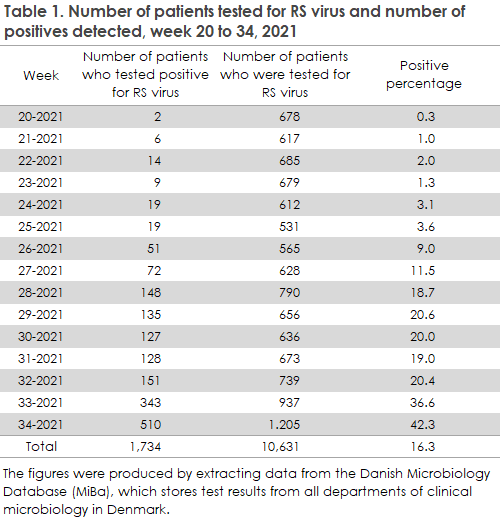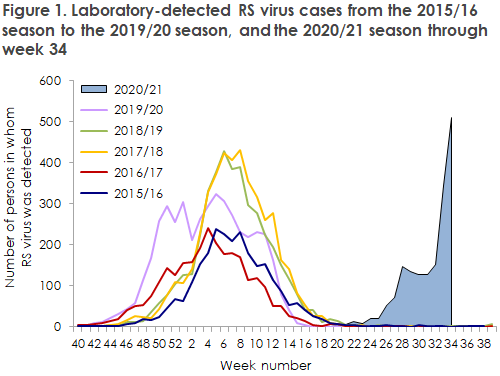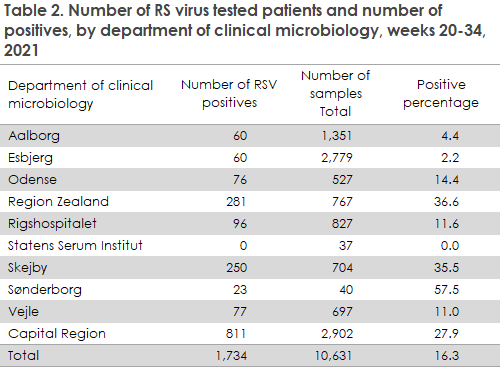No 35 - 2021
Extraordinarily high occurrence of RS virus
Information about ordering influenza vaccines for the 2021-2022 season
Extraordinarily high occurrence of RS virus
Currently, an extraordinarily high occurrence of RS virus is being recorded in Denmark. Earlier this summer, RS virus infection started to increase, EPI-NEWS 27/21, and transmission has continued increasing heavily in recent weeks, Table 1. In week 34 alone, a total of 510 cases of RS virus were detected, which exceeds the normal weekly number recorded during the RV virus infection peak period in winter months, Figure 1. Since Week 20, a total of 1,734 cases of RS virus have been detected. The share of cases among children aged 1-3 years is higher in the 2020-21 season than has been the case in previous seasons.


Overall, fewer patients are currently being tested for RS virus than during a normal winter season. Even so, as much infection is detected as during a normal winter season. This underlines two aspects: first that the current level of infection may be considerably more widespread than during a normal winter season, and secondly that all treating physicians should remain aware of RS virus and ensure diagnostic testing of patients presenting with relevant symptoms.
Some signs of a geographical difference in infection levels within Denmark have become apparent, Table 2.

Commentary
The exact reason why we are experiencing this surge in RS virus occurrence at this time of the year remains unknown, but the same situation being observed in several other countries.
One possible explanation may be an effect of the recent re-opening of the community following the lock-down and restrictions imposed during the COVID-19 epidemic, and the return of travel activities. Another contributing factor may be a lower level of protective immunity against RS virus among children due to the reduced occurrence of RS virus in the past winter season when the prevalence of RS virus and a wide range of other airway infections, including influenza, decreased considerably owing to the restrictions and hygiene precautions introduced to counter COVID-19.
All treating physicians are encouraged to remain attentive to RS virus, particularly in the youngest children who are more affected by the condition. On clinical suspicion of RS virus infection, we recommend ensuring that the relevant microbiological tests are made to confirm or dispel the diagnosis.
For more information about RS virus, please see the SSI Disease Encyclopaedia here (in Danish Language).
(R. Trebbien, Department for Virus and Microbiological Special Diagnostics, L.S. Vestergaard, H-D. Emborg, Department of Infectious Disease Epidemiology and Prevention)
Information about ordering influenza vaccines for the 2021-2022 season
The annual influenza vaccination campaign will soon start. Even so, the executive order describing the use of this year’s use of influenza vaccines has not been finally approved and published. Statens Serum Institut expects to start taking influenza vaccine orders in Week 36.
In the meantime, information about the year’s influenza vaccines including prices and terms of delivery are available at the SSI’s website. This year’s vaccines comprise the following: Four-valent influenza vaccines (for general risk groups), high-dose vaccines (reserved for +85-year-olds) and nasal influenza vaccines for children.
For children and healthcare workers and also for the usual target groups of the influenza vaccination programme, the offer of free vaccination will be in place from 1 October 2021 to 15 January 2022.
However, for some groups, the offer will remain in place until the end of February - this applies to pregnant women in their second and third trimester, people with congenital or acquired immune deficiencies and members of their household.
Please note that vaccines ordered with and supplied by Statens Serum Institut from Week 36 through 24 October 2021 are to be used exclusively for vaccination in pursuance of the executive order.
This is so to ensure a sufficient number of vaccines for vaccination of the risk groups. Subsequently, vaccination of persons not covered by the executive order will be possible, provided vaccines are available for this purpose.
Additional, detailed information about this year’s influenza vaccines will be published in a subsequent issue of EPI-NEWS.
(L.K. Knudsen, L.S. Vestergaard, Department of Infectious Disease Epidemiology and Prevention)
2 September 2021